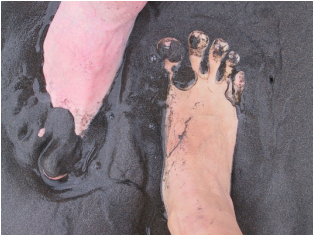Jeremiah Chapter 38 Lessons from the text The Dangers of Speaking Truthfully In response to Jeremiah’s prophecy regarding Jerusalem, the princes want to put him to death. While they had defended him in the past, they now wrote him off as a traitor wanting to weaken the hearts of Jerusalem’s soldiers (Jer. 26:16). They failed to listen to God’s warning to repent or face destruction. Now that destruction was on their footsteps, they would not even consider God’s words. They completely rejected God and wanted to be rid of His prophet. Whenever you get up and speak the truth from God’s word, you will gain enemies. Sinners may listen to you at first, but as they feel their judgment drawing ever closer, they will become more and more intolerant of the truth. If God lays it on your heart to speak, then by all means speak. Just be aware that by so speaking God’s truth, you may be ridiculed, mocked, and even martyred in their rage. If God has promised to go with you as He promised Jeremiah, then be assured that you will succeed in your mission of sharing God’s truth, whatever that mission may be. The warning, however, is that if God has not called you to go or told you to speak, then you had best not go or speak because when your enemies come against you, God will not be there to deliver you. The role of a preacher, teacher, or messenger of the Gospel is dangerous, yet it is also wonderfully rewarding to those called to share God’s truth. Verse by Verse Commentary Jeremiah sinks into the mire, or mud, so deep that it takes 30 men to pull him out. Jeremiah sinks into the mire, or mud, so deep that it takes 30 men to pull him out. 1-4 Because of the words that Jeremiah has prophesied and his attempt to leave Jerusalem (Jer. 37:11-13), he is accused of treason. God’s words can easily be construed as encouraging the Jews to defect to the invading army. God has, from the first arrival of Babylon, announced that the Jews should be subservient to the nation. God is not so much telling the Jews to defect as much as that if they surrender, they will be able to remain in their lands instead of being deported (Jer. 21:9, 27:11). God is telling them to go out so that they can stay. 5 The king listens to his princes and puts Jeremiah in their care. Zedekiah is afraid to rebel against them, revealing a cowardliness in his character. Since he has committed Jeremiah to be given daily bread he obviously cares for the prophet's well-being (Jer. 37:21). 6 Mire is mud. This dungeon is a deep hole with no way out other than to be pulled up by rope. The princes leave him there to die (v.4). 7-9 Without the king’s protection, Jeremiah is at the mercy of others in the prison to throw him food and water. Ebedmelech knows that since the famine is prevailing in the city, no one will spare Jeremiah what he needs to survive. He therefore pleads for the king to retrieve him out of the dungeon. 10 The king grants Ebedmelech his request. The fact that thirty men are required to draw him up shows how deep the whole is and how thick the mud is. 11-13 Ebedmelech uses old cloths and towels to create a rope to draw Jeremiah, probably because all the rope of the city has been used by the military to ward off the siege. After he is freed, Jeremiah returns to the king's protection within the court of the prison being fed with the king's bread. Noteworthy is that despite Zedekiah’s fears, the princes do not challenge the king's decision to protect Jeremiah (v.5). Zedekiah still has the obedience of his princes. 14-15 Zedekiah has begun to turn to Jeremiah for help from God because he is realizing that his own plans are not succeeding. Jeremiah, however, is leery of the king because he knows the Zedekiah is not turning his heart to God but is merely getting desperate. Jeremiah also remembers the fact that Zedekiah turned him over to the princes to die in the miry dungeon. 16 Zedekiah promises that he will not harm Jeremiah for speaking the truth on God's behalf. He furthermore promises that he will not again turn Jeremiah over to his enemies. 17-18 Jeremiah's message to the king is the same that he has been proclaiming from the beginning; if Zedekiah will put himself under the rule of Babylon, then he and the city will continue to live in peace, but if they do not, destruction is coming (Jer. 27:5-12). 19-20 Zedekiah is not willing to surrender to Babylon because he is afraid that if he does so, the Jews who have defected will turn around and abuse him. However, rather than fearing other men, Zedekiah should fear God, and then he would live. 21-23 Jeremiah spells out the consequences of disobeying God's command to surrender. What he lists is considerably worse than Zedekiah objection to surrendering of being mocked by his peers. 24-26 Since Jeremiah has commanded that king to surrender, Zedekiah knows that such words only help the cause of Jeremiah's enemies and therefore tells him to not reveal the discussion. 27-28 Rather than questioning the king about his decision, the princes come to Jeremiah to see why he has been released. Jeremiah obeys Zedekiah's command and says that he was bargaining for provision from the king in the famine. The princes believe Jeremiah's word, and so he is left in the prison court for the remainder of the siege. ___________________ Thank you for your faithfulness in studying God’s word. Please comment below to share what you learned from today's lesson.
0 Comments
Leave a Reply. |
Devotional Categories
All
Archives
September 2023
|
|
Join my mailing list!
|
Thank you!You have successfully joined our subscriber list. |
|
© 2024 Melissa Beaty
|
